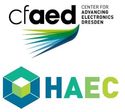12.1 Special Day Session on Designing Autonomous Systems: Self-awareness for Autonomous Systems
Date: Thursday 22 March 2018
Time: 16:00 - 17:30
Location / Room: Saal 2
Chair:
Nikil Dutt, University of California at Irving, US
With increasing interest in the deployment of autonomous vehicles and robots, a critical open challenge is to empower these systems with self-awareness for achieving truly autonomous operation. Self-awareness principles hold the promise to manage effectively continuous change and evolution, application interference, environment dynamics and system uncertainty, thereby adhering to safety, availability, and security guarantees as needed. The goal of this special session is to make the audience appreciate the benefits of self-awareness for systems autonomy, highlight challenges for self-awareness using two application contexts (unmanned aerial systems and autonomous vehicles), and outline EDA and HW/SW challenges to support self-awareness for systems autonomy.
| Time | Label | Presentation Title Authors |
|---|---|---|
| 16:00 | 12.1.1 | SELF-AWARENESS AND BEHAVIOR ASSURANCE FOR UNMANNED AERIAL VEHICLE (UAV) SYSTEMS Speaker: Prakash Sarathy, Northrop Grumman, US Authors: Peter Lee1 and Prakash Sarathy2 1Corenova Technologies Inc., US; 2Northrup Grumman Corporation, US Abstract Self-awareness principles hold the promise to manage effectively continuous change and evolution, application interference, environment dynamics and system uncertainty, thereby adhering to safety, availability, and security guarantees in complex systems. This is certainly true for unmanned vehicles that are capable of autonomous operations. In this paper, we provide a brief overview of factors driving a significant increase in autonomous vehicles for both civilian and military markets, and provide a summary of current capabilities and limitations of the state-of-practice. Furthermore, we examine the nature of current and future autonomous operations in the context of desirable characteristics such as reliability, safety, resiliency and robustness properties and identify extant challenges to achieving them. We intend to highlight some approaches and technologies that offer promise in addressing the aforementioned challenges from a technical perspective. To further ground this discussion two distinct real-life use cases will be discussed, namely a) Controlled airspace launch and recovery and b) coordinated operations in a controlled airspace. These usecases will serve to underscore the significant obstacles that lie ahead, in order to realize a full spectrum of autonomous capabilities in the near future. |
| 16:30 | 12.1.3 | PROMISES AND CHALLENGES IN DEPLOYING SELF-AWARENESS IN AUTONOMOUS VEHICLES Author: Christoph Stiller, Karlsruhe Institute of Technology (KIT), DE Abstract This talk will a) review levels of autonomy for self-driving cars; b) outline approaches and challenges for achieving full autonomy for self-driving cars; c) highlight differences and additional challenges over autonomous aircraft for self-driving cars; and d) elaborate the potential of cooperativity for automated driving. The talk will draw on lessons learned and challenges to be overcome from the perspective of the German Research Priority Program "Cooperative Interactive Automobiles". |
| 17:00 | 12.1.3 | DESIGN METHODOLOGIES FOR ENABLING SELF-AWARENESS IN AUTONOMOUS SYSTEMS Speaker: Andreas Herkersdorf, Technical University Munich (TUM), DE Authors: Armin Sadighi1, Bryan Donyanavard2, Thawra Kadeed3, Kasra Moazzemi2, Tiago Muck2, Ahmed Nassar2, Amir Rahmani2, Thomas Wild1, Nikil Dutt4, Rolf Ernst3, Andreas Herkersdorf5 and Fadi Kurdahi4 1Technical University of Munich (TUM), DE; 2University of California at Irvine (UCI), US; 3TU Braunschweig, DE; 4University of California, Irvine, US; 5TU München, DE Abstract This paper deals with challenges and possible solutions for incorporating self-awareness principles in EDA design flows for autonomous systems. We present a holistic approach that enables self-awareness across the software/hardware stack, from systems-on-chip to systems-of-systems (autonomous car) contexts. We use the Information Processing Factory (IPF) metaphor as an exemplar to show how self-awareness can be achieved across multiple abstraction levels, and discuss new research challenges. The IPF approach represents a paradigm shift in platform design by envisioning the move towards a consequent platform-centric design in which the combination of self-organizing learning and formal reactive methods guarantee the applicability of such cyber-physical systems in safety-critical and high-availability applications. Download Paper (PDF; Only available from the DATE venue WiFi) |
| 17:30 | End of session | |











